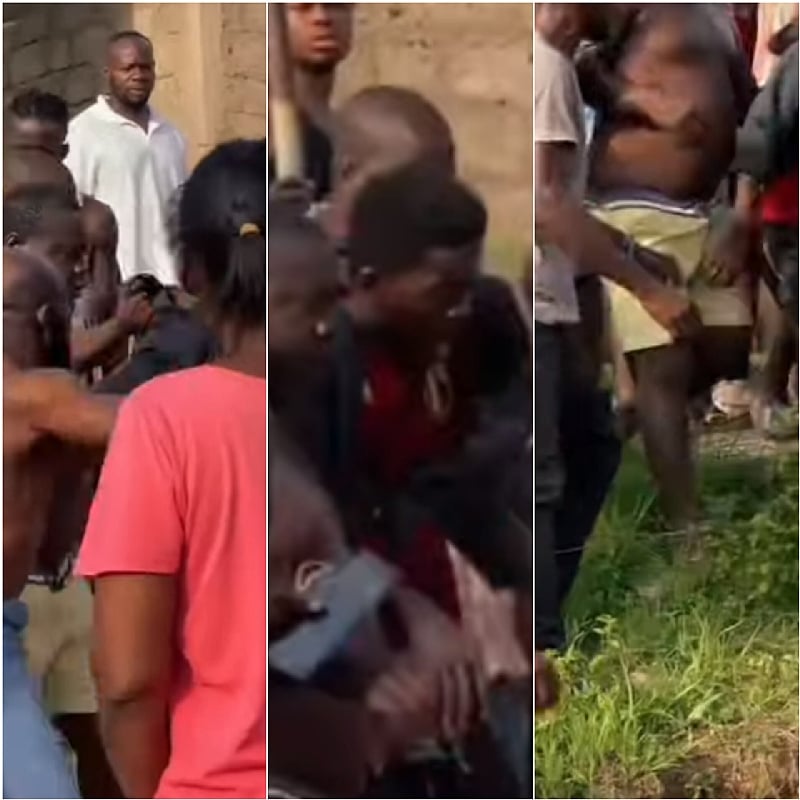The incident began in the early morning hours, shrouded in the quiet stillness of a typical residential area. A suspected thief, whose identity remains unknown at this time, was discovered lurking within the confines of an unfinished building. His presence, a jarring anomaly in the otherwise peaceful landscape, quickly drew the attention of vigilant community members. The discovery ignited a spark of fear and anger amongst the residents, emotions fueled by a perceived vulnerability and potential threat to their collective safety. The exact circumstances that led to the suspect’s presence in the uncompleted structure remain unclear, fostering an atmosphere of speculation and suspicion further intensifying the community’s response.
Once discovered, the suspect’s attempted escape was swiftly thwarted by the converging residents. The initial containment, however, quickly escalated into an act of mob violence. A number of individuals within the crowd resorted to physical assault, subjecting the suspected thief to a barrage of blows. While the exact extent of his injuries remains unreported, the video footage clearly depicts a chaotic scene of physical aggression. The suspect’s pleas, if any were uttered, are lost amidst the cacophony captured in the low-quality audio, painting a disturbing picture of uncontrolled retribution. The footage serves as a stark reminder of the dangers of mob justice, highlighting the ease with which a collective’s fear and anger can spiral into uncontrolled violence.
This unfortunate incident joins a growing list of similar occurrences across Ghana, revealing a troubling trend of extrajudicial punishment. Suspected thieves, often caught in the act or under suspicious circumstances, are increasingly subjected to immediate retribution at the hands of community members rather than being handed over to law enforcement agencies for due process. This pattern speaks to a deeper societal issue, reflecting a potential erosion of public trust in the formal justice system, or perhaps, a perceived inefficiency in its ability to effectively address petty crime. The recurrence of such incidents underscores the urgent need for a comprehensive response from both authorities and community leaders.
The reasons behind this rising tide of mob justice are complex and multifaceted. They likely include factors such as frustration with perceived leniency in the judicial system, a desire for swift and visible justice, and a pervasive culture of impunity that emboldens such actions. Additionally, the rapid dissemination of information and inflammatory rhetoric through social media can further exacerbate the situation, fueling public outrage and prompting impulsive actions. The ease with which video footage of such incidents spreads online can also contribute to a cycle of violence, normalizing mob justice and potentially inspiring copycat actions in other communities.
Authorities in Ghana have repeatedly cautioned the public against taking the law into their own hands. They emphasize the importance of upholding the rule of law and respecting the fundamental rights of all individuals, regardless of suspected wrongdoing. The police have consistently urged communities to report suspected criminals to the appropriate authorities, emphasizing that due process is essential for a just and equitable society. They stress that mob justice not only undermines the legal system but also poses a serious threat to public safety, as it can easily lead to misdirected violence and the infliction of undue suffering on potentially innocent individuals.
Addressing this escalating problem requires a multi-pronged approach. Strengthening the criminal justice system, ensuring its efficiency and transparency, is paramount. This includes improving investigative procedures, ensuring timely prosecutions, and promoting public awareness of the judicial process. Simultaneously, community engagement and education play a vital role. Promoting dialogue around the dangers of mob justice, emphasizing the importance of due process, and fostering trust in law enforcement are all crucial steps in curbing this disturbing trend. Ultimately, the solution lies in a collective effort to uphold the rule of law, ensuring that justice is served through established legal channels, protecting both individual rights and the integrity of the judicial system. The incident serves as a stark reminder of the fragility of social order and the importance of collective responsibility in maintaining a just and peaceful society.


